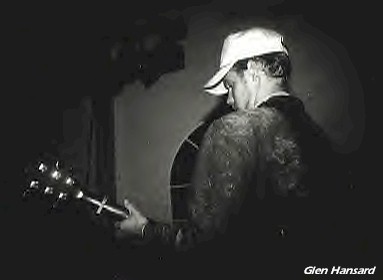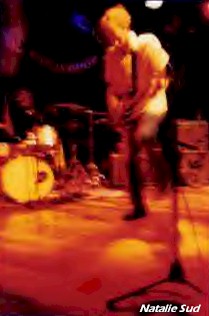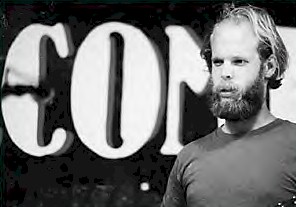|

Bonnie 'Prince' Billy
a.k.a Will Oldham:
A Prince and
His Palace
by tim mcmahan
|
|
|
Lazy-i: August 7, 2001
August 14
Bonnie "Prince" Billy
featuring Rian Murphy
Pinetop Seven
Simon Joyner
The Music Box
7777 Cass St.
$10/$12 DOS
18 and Over
|
The Bonnie "Prince" in question is Will
Oldham, one of the country's most renowned singer/songwriters, who has
generated a cult following with his recordings as Palace throughout the
'90s.
Though he's an indie phenomenon, Oldham's notoriety goes beyond the
underground. Johnny Cash recorded an Oldham song on his last album; P.J.
Harvey wants to cut a collection of country duets with him, and odd-ball
diva Bjork is covering an Oldham song on her next CD.
Meanwhile, Oldham's music is virtually untraceable on American radio
waves. It's a crime, because his brand of country-tinged singer-songwriter
fare boasts strong, soothing and at times dark melodies to match his
lyrics' stark imagery. Oldham's sound is reminiscent of Richard Thompson
(if Thompson were from Louisville instead of England), Mark Eitzel (but
without Eitzel's overwhelming sense of dread) or Smog (without Bill
Callahan's rock tendencies).
His latest CD, Ease Down the Road, recorded as Bonnie
"Prince" Billy, is a rural stroll through a Terrence Malick-drawn
countryside filled with striking portraits of love, lust and loneliness.
Oldham's voice is a subtle, tired moan that falls like fine dust over the
music's acoustic, afternoon-lit arrangements.
Oldham's life is all about his music. He dropped the Palace moniker in
the late '90s, recording under his given name before taking on the Bonnie
"Prince" Billy title. By then, Palace had been elevated to the
summit of the indie singer-songwriter mountain. So why drop the Palace
name? Oldham, who spoke by phone from Chicago where his band was
rehearsing for the tour that brings them to the Music Box Aug. 14, said
the name change was the result of new personnel as well as his views on
how art should be considered. |
|
|
"Part of (the name change) was
wanting to preserve an identity of each record because of the musicians
involved," he said. "But in an ideal world, records would be
filed in record stores by title rather than by artist, as they are in
video stores. I think it's better to identify with the work rather than
the people who make the work. You can put your faith in a piece of work,
but not in a group of people you don't know."
It's a concept that runs smack in the face of a music industry that
thrives on building name recognition, then selling-selling-selling the
name and image to the huddled masses.
"I'd like my records to reach as many people as possible,"
Oldham acknowledged, "but I'm also thinking in terms of how I can
keep from getting jaded or unhappy with the process."
One way he's kept out of the industry muck was to create his own label.
For years Oldham released CDs on Drag City Records. But in '97 he created
Palace Music, the label that released Ease on Down the Road. Having
his own label "makes it less of an uphill battle, I guess. It's
oftentimes is still a struggle, but the struggle is less than it once
was."
He says he's built a relationship with a core group of musicians, other
labels and business associates "following argument after argument,
subtle suggestion after subtle suggestion, and success after
success."
Oldham breaks from the singer/songwriter's "solitary man"
tradition, having collaborated with a core group of talented musicians his
entire career on songs that seem uniquely introspective but have nothing
to do with his own life experiences.
"I don't know what the point would be," he said of
autobiographical songwriting. "The songs are not meant to be real
life. They're meant to have a psychic -- rather than a factual -- bearing
on the listener. It's rare that a song grounded in reality moves me
because I don't feel like I'm getting the whole story. Songs are made to
exist in and of themselves, like a great James Jones or Robert Louis
Stevenson novel -- they're not autobiographical, and yet there's a reality
in every single page. It's real life of the imagination."
In fact, Oldham said, autobiographical songwriting would lead to a
"perversion of an approach in life that I couldn't live with. How
could you have a good time with a brother, wife or girlfriend or have an
argument with them and not think about how to capitalize on the situation
in your material?" |

|
"I think it's better to
identify with the work rather than the people who make the work." |
|
|
|

|
"I was happy and I
didn't have to listen to the radio. It's nice to be able to
backtrack and not be embarrassed by the music you used to listen to." |
|
|
Oldham's comments were similar to Bill
Callahan's of Smog, another renowned indie singer/songwriter (and friend
of Oldham) who swears his music has nothing to do with his life. In both
cases, their songwriting and lifestyles insist that they isolate
themselves from the world of popular culture to a place inhabited by only
a handful of loyal listeners. Though he says at no time in his life has he
been able to turn on commercial radio and listen to a half-hour of great
music, Oldham grew up on pop.
"The first music I bought when I was nine or 10 was pop music from
the '50s and '60s, like The Everly Bros., Elvis, Del Shannon, The
Flamingos, The Platters, whatever I could get my hands on," he said.
"And then some musical things, like Camelot, Singing in the
Rain and Hair. I watched a lot of musicals on TV and a lot of
Hitchcock, Bogart, and Cary Grant movies. Then I started listening to
stuff my brother played, like The Fall, early Lou Reed and The Ramones.
From there, I spent time with musicians and I started seeing and listening
to bands like Husker Du, Foetus, Big Black and Dinosaur Jr. I was happy
and I didn't have to listen to the radio. It's nice to be able to
backtrack and not be embarrassed by the music you used to listen to."
Oldham says he's content making music that will only be enjoyed by a
small group of people, so much so that he says success would likely lead
to an early end of his career.
"I Iike the relationship that I have with my music," he said.
"To be able to be accepted (in the popular culture) would distort my
view of music. For example -- and this is purely hypothetical -- a
musician like Beck, who hit it big with his novelty hit "Loser,"
was forced into a different world right away. He still made music he liked
and had critical success and the girls liked it and everything, but I
can't help but get the sense that it was a few steps too many, where he
ended up adopting so many superficial stylistic changes to his music. His
brain was forced to find interesting things without a foundation.
"If the general public welcomed one of my songs, the logical thing
to do would be to retire or not make music anymore, because I could never
to make it the same way again. If I had a hit song tonight I wouldn't be
able to approach music the same way tomorrow morning. Rather than try to
pretend that I could, I would rather pursue surfing. People would be
buying my next record based on the acceptance of that one song, and it
would create disappointment that isn't a part of the process now."
Yeah, but why should he care if they're disappointed?
"Because it would affect the other audience members who have a
strong relationship with my music," Oldham explained. "It would
be harder for them to enjoy because the audience would have changed and
there would be that dynamic of anticipation and disappointment entering
into the music. My booking agent would then want me to play venues for
2,500 people who expect me to play certain songs, but I would prefer to
play to 250 people who were really listening. It wouldn't be fun to play
those shows.
"I like playing shows where we're all in it together, rather than
live that kind of life where it's a struggle against the way it was in the
beginning. In that case, it would be better to not be available at
all."
Back to 
Published in The Omaha Weekly August 8, 2001. Copyright ©
2001 Tim
McMahan. All rights reserved. |
|
|

![]() webboard
interviews
webboard
interviews